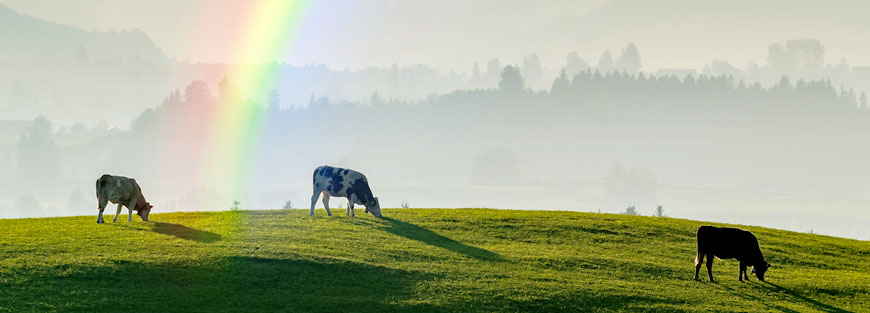
Livestock
Animal Identification
The Kentucky Department of Agriculture is cooperating with USDA on improving the traceability of US livestock moving interstate when animal disease events take place. Currently, all livestock 18 months or older sold at a Kentucky approved livestock market must be identified to the farm of origin.
Under the proposed rule, unless specifically exempted, livestock moved interstate would have to be officially identified and accompanied by an interstate certificate of veterinary inspection or other documentation, such as owner-shipper statements or brand certificates. The proposed rule encourages the use of low-cost technology and specifies approved forms of official identification for each species, such as metal ear tags for cattle. However, recognizing the importance and prevalence of other identifications in certain regions, shipping and receiving states or tribes are permitted to agree upon alternative forms of identification such as brands or tattoos.
Bovine Program
Tuberculosis (TB) Accreditation Program
Kentucky became a Tuberculosis Free state in November 1987. We continue to manage this voluntary program for those herd owners that wish to maintain a "tuberculosis accredited herd status". This program is managed by our office, but the qualifying methods are mandated by USDA (listed in the UM&R, latest update 1/1/05). The certification program is only available for cattle, bison, or cervid herds.
Bovine Tuberculosis Pamphlet-Information for Producers.
Brucellosis Certification Program
Kentucky became a Brucellosis Free state in 1997. We continue to manage this voluntary program for those herd owners that wish to maintain a "brucellosis certified-free herd". This program is managed by the KDA, Office of State Veterinarian, but the qualifying methods are mandated by USDA (listed in the UM&R). The certification program is only available for cattle, bison, or cervid herds.
Testing Qualifications
Johnes Information & Education
Johne's (pronounced "Yo-nees") disease is a chronic, contagious bacterial disease that affects the small intestine of ruminants such as cattle, sheep, goats, deer, antelope and bison. All ruminants are susceptible to Johne's disease.
Johne's disease is caused by Mycobacterium paratuberculosis, a hardy bacterium that embeds itself in the wall of the lower part of the small intestine known as the ileum. As an immune response, infected tissues attempt to regenerate healthy tissue which leads to visible thickening of the intestines. This prevents nutrient absorption, resulting in weight loss. Late in the infection, antibody production by the animal can be found in serum of animals and is an indicator that clinical signs of disease and death from the infection will soon follow.
Sheep and Goats
Effective January 1, 2018, ALL sheep and goats MUST be identified with an official Scrapie identification prior to unloading/sold at a Kentucky Livestock Market or Swap Meet. This requirement applies to all sheep and goats regardless of age, breed or sex. (Pursuant to 302 KAR 20:065/040)
Updated Information Regarding Scrapie Tag Orders
Effective September 1, 2019, USDA APHIS VS is no longer providing free metal scrapie tags to Kentucky sheep and goat producers. For the next 12 months, USDA APHIS VS will still provide up to 80 free, white plastic serial tags for producers that have never received free scrapie tags before. Tag applicators for the plastic tags will have to be purchased by producers.
Sheep and goat producers can still order the metal serial tags (now orange rather than white) from National Band and Tag (NB&T). Producers will also have to purchase the tag applicators if they do not already have them, as USDA APHIS no longer has funds to provide these.
National Band & Tag Company
Phone: (859) 261-2035
Fax: (859) 261-8247
E-mail: tags@nationalband.com
NB&T Website
If you believe that you are eligible for the free plastic scrapie tags, or if you have questions regarding scrapie tag ordering, please contact:
USDA APHIS VS
105 Corporate Drive, Ste. H
Frankfort, KY 40601
Phone: (502) 848-2054
Fax: (502) 848-2041
Swine
- Pseudorabies - Kentucky is Stage V
- Brucellosis - Kentucky is a Free State
Garbage Feeding
Feeding Garbage to swine is illegal. It is one of the ways to spread Foot and Mouth Disease (FMD). FMD is a severe, highly communicable viral disease of cattle and swine. This country has been free of FMD since 1929, when the last of nine U.S. outbreaks was eradicated. Download the Garbage Feeding Brochure
The following swine shall not be imported into KY for any purpose:
- Garbage Fed Swine
- Swine vaccinated with Pseudorabies vaccine
- Wild, captive wild or feral swine, Sus scrofa per definition, including Russian wild boars or Eurasian wild boars

